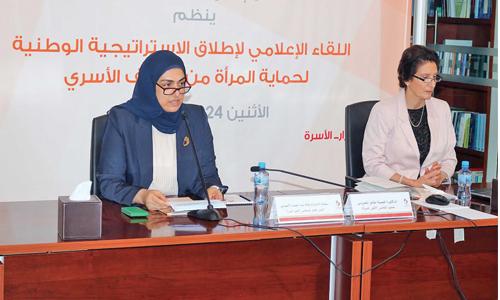SCW launches strategy on violence against women
The Supreme Council for Women (SCW) launched its well sought-after national strategy for the protection of women from domestic violence yesterday, just two days before International Day for the Elimination of Violence against Women.
The national strategy was declared before a high-profile attendance, including Members of Parliament and Shura Council and representatives from the government, NGOs and print and electronic media at the SCW headquarters here in Bahrain.
Secretary-General of the SCW Hala Al Ansari and Chairperson of the national team that formulated the strategy and SCW member Dr Fadheela Al Mahroos addressed the conference.
Speaking to DT News on the sidelines, Dr Fadheela said that the victims of domestic violence must ‘break their silence’ as hiding the problem was not going to solve it anyway.
“They should know that they are not alone in this country and that they are being cared of at the highest level,” she says.
She said that the main aim was not to punish the abuser but to rehabilitate the whole family.
MP Roua Bader Al Hayki said the national strategy focused on preventing any abuse, which the Bahraini women have been facing since long back.
“I am very grateful that we have such a strategy that focuses on trying to prevent the abuse,” says Roua.
“Being Members of Parliament and the representatives of the people, we can really play a big role here by making sure that some parts of this strategy are implemented through specific entities. But the question is how much of this strategy is reflected in the government programme?,” she asks.
Roua was much concerned about the implementation of the strategy as Bahrain was facing a lot of economic problems and the government was quite busy with those issues. And in the face of all those big problems, she hopes the implementation of the national strategy may not be ignored and will be implemented effectively.
Dr Fadheela said they had worked out this strategy in cooperation with many national partners from government and non-governmental organisations and it took them the whole year to form this strategy. The national team put this strategy after analysing the women’s current situation and the challenges faced by the Bahraini women and families.
The strategy comprises six strategic objectives. The first and primary objective is to prevent violence by addressing all the issues that can pose threat to the family.
The secondary objective is targeting the families that are at the risk of the abuse, like the families facing financial difficulties, addiction or alcoholism, lack of education and problems with housing etc.
Any of these situations can put the families at the risk of abuse. The third objective is to improve and create services for the women who are the subject of abuse - effective and coordinated services that can provide the basic needs of women whether they are social needs, health needs, psychological needs or legal needs or supporting in general. The fourth component of the strategy is looking at laws and improving them and the legislation in general. The fifth component is education – using the media to improve the language in the media that puts down the women and legitimises and glamorises the violence against women.
“The language of the media glamorising the women has to be changed,” says Dr Fadheela.
The last objective is to evaluate what they are doing through studies, collecting data about violence so that they may be able to assess the impact of this strategy on women – five to 20 years from now onward.
The biggest challenge in this regard is that it is very sensitive issue because it is related to the family.
Whatever happens inside the family remains a secret and no one wants to take it out. But, hiding the problem doesn’t solve the issue, because the impact of the violence inside the family will overflow and spill over to the society one day.
Though violence happens inside home, unseen by the people, it is a social and national problem that needs to be addressed because it is going to impact on the whole society in the long run.
“Now, we have a law on violence against women, so it is no longer a private issue,” says Dr Fadheela.
Photo Caption: Hala Al Ansari is addressing the conference as Dr Fadheela Al Mahroos looks on
Related Posts

